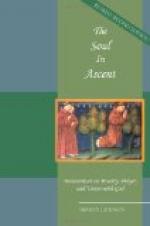In some way men have been kept dissatisfied with their ignorance and persistent in their search for truth. I make no distinction between sacred and secular here because all truth is sacred. Scientist and theologian alike have to do with reality. Whether we examine the tracks of an extinct animal on ancient rocks, or bow our heads in prayer, we are facing a real world which is steadily enlarging. For centuries men have sought the causes of things; they have been made to feel that they ought to do right, and then have been inspired with a passion to discover the right. This is very wonderful. The being who has almost limitless powers of physical enjoyment, whose senses are exquisitely fitted for pleasure, is not satisfied with pleasure, but, in obedience to unseen attractions, ever seeks for higher things. Whence does this eagerness come? Is it from man himself? Then our problem is great indeed, for, at one and the same time, something within himself impels him upward, and another something drags him downward. But the point for special consideration now is that the soul is never satisfied with anything but truth, that the history of thought is the record of the search for truth, that every new discovery has acted as a stimulus to still more ardent exploration, and that the search is always for elemental realities, the causes of phenomena, for “things as they are.” The promise of Jesus was fulfilled long before it was spoken. Some one, in all the ages, has been leading into truth and showing things to come; and the process was never more evident than after all these years of intellectual and spiritual progress. I say some one has led. By that I mean a personal spirit, unseen, but ever present; for how could he whose home is in the mire be supposed, steadily and unwaveringly, to reach toward the skies unless there was some attraction in the skies? The only attraction for one spirit is another spirit. This age-long, unwavering passion for truth and progress, the wisest of men have believed to have been inspired by Providence or God or by guardian angels—which after all are only other ways of stating the doctrine of Jesus concerning the Holy Spirit.
Another phase of this subject is the power, which has seemed to come from outside the soul, to sustain and help those who have been called to endure bitter and long-continued sorrow and pain. Those who feel themselves to be weak as water under the stress of severe trial, almost without previous suggestion, assume the proportions of heroes. They endure and suffer with patience what would crush those who are only physically brave and strong. A woman who seemed to have few resources in herself, suddenly lost four children. In speaking of it, she very simply but forcefully, said: “I could never have endured it myself.” She believed that her fragility had been reinforced by one stronger than herself. Exceptional physical courage will account for deeds of amazing heroism like that displayed at the sinking of the Merrimac in the harbor of Santiago. Some persons are thus gifted by nature, as others have a poetic temperament. But exhibitions of physical valor, stimulated by the consciousness of world-wide applause, are very different from the patience with which weak persons accept heavy burdens without a murmur, and carry them apparently without assistance, sustained only by the consciousness of being right.




